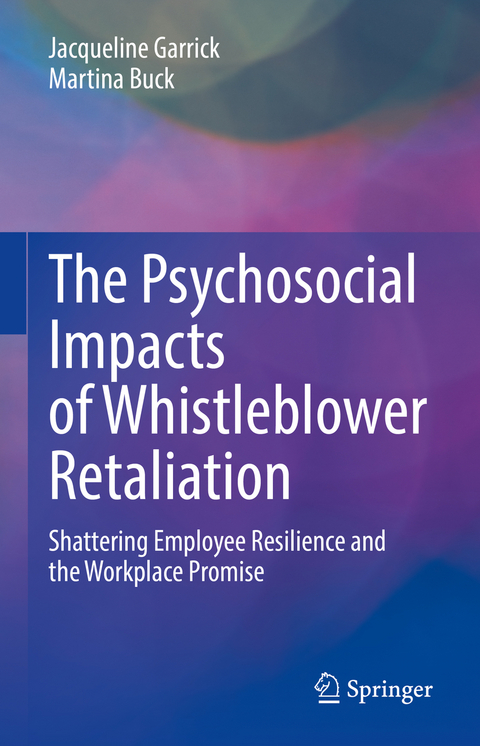
The Psychosocial Impacts of Whistleblower Retaliation
Springer International Publishing (Verlag)
978-3-031-19054-4 (ISBN)
Stigma and biases against whistleblowers interfere with their ability to make protected disclosures when harm to others is at stake. Retaliatory toxic tactics create an atmosphere and corporate culture that embodies fear and encourages bystander behavior.
In this book, the authors explore psychosocial impacts across domains that include financial, legal, social, physical, and emotional well-being. Ten of the 14 chapters specifically examine the toxic tactics of retaliation: gaslighting, mobbing, marginalizing, shunning, devaluing, double-binding, career blocking, counter-accusing, bullying, and doxxing. These toxic tactics are the building blocks of workplace traumatic stress (WTS) and can lead to posttraumatic stress disorder (PTSD), depression, substance abuse, and suicide. WTS is a term that differentiates between workplace violence or job stress, which can be components of WTS but do not fully describe the systemic hostile work environment that targets an employee. Understanding WTS and how it disrupts identity, causes moral injury, and shatters world views are important aspects for clinicians treating clients who are victims of this kind of hostile work environment.
The Psychosocial Impacts of Whistleblower Retaliation is a useful resource offering a new way for social workers, mental health providers, advocates, and other support services professionals and practitioners to assist whistleblowers. It helps clinicians understand how to view patients suffering from whistleblower retaliation and gives them a lexicon for forensic evaluations. Lawyers, especially those specializing in employment, labor, and Qui Tam cases, also could benefit from having a means to describe the psychosocialimpacts of retaliation and WTS on their clients when filing for compensatory damages for pain and suffering during judicial proceedings. Finally, the book could appeal to employees and managers, human resources professionals, victim rights advocates, elected officials, media personnel, and other professionals who are interested in learning more about whistleblower retaliation and its psychosocial and cultural implications.
Jacqueline Garrick received her MSW from Temple University and is an LCSW-C in Maryland. She served as a US Army Social Work Officer and spent decades working with and addressing veterans’ issues with a primary focus on posttraumatic stress disorder and suicide prevention. She has worked for The American Legion, Departments of Defense and Veterans Affairs and the US Congress. She founded Whistleblowers of America after experiencing a hostile work environment at the Pentagon and seeing the similarities to combat veterans. She is the author of several articles, books and chapters on traumatic stress and suicide and has presented testimony before Congress and at numerous events. She opened the Workplace Promise Institute in Pensacola, Florida after winning her case at the Merit System Protection Board. Martina Buck, PhD received her BA in Microbiology from the University of California San Diego (UCSD). She then continued at UCSD, in the Biomedical Sciences Program at the School of Medicine, to earn a PhD in Molecular Biology. Dr. Buck was a National Cancer Institute Postdoctoral Fellow at the Salk Institute, in the laboratory of Dr. Tony Hunter. She began her academic career at UCSD as a Research Scientist and rose to the rank of Associate Professor of Medicine with independent funding and tenure within ten years. Her academic career was cut short by retaliation brought on by her whistleblowing. She is now the Co-Founder and CEO of Xfibra, Inc., a biotech start-up that researches and develops first- in- class, anti-fibrotic, anti-inflammatory therapeutics of her design. Because of her experiences, she is also an active advocate for whistleblowers through research and peer counseling with Whistleblowers of America.
1. Morality, Virtue, and Ethics .- Part II. Toxic Culture and Tactics.- 2. Toxic Leaders and Their Impact.- 3. Gaslighting.- 4. Mobbing.- 5. Marginalizing.- 6. Shunning.- 7. Devaluing.- 8. Double-binding.- 9. Career Blocking.- 10. Counter-accusing.- 11. Bullying.- 12. Doxxing.- Part III. The Scope of Harm and Damages.- 13. Psychosocial and Cultural Implications .- Part IV. The Workplace Promise.- 14. Implications for Organizations.
| Erscheinungsdatum | 14.12.2022 |
|---|---|
| Zusatzinfo | XIX, 231 p. 8 illus., 7 illus. in color. |
| Verlagsort | Cham |
| Sprache | englisch |
| Maße | 155 x 235 mm |
| Gewicht | 532 g |
| Themenwelt | Geisteswissenschaften ► Psychologie |
| Sozialwissenschaften ► Pädagogik ► Sozialpädagogik | |
| Sozialwissenschaften ► Soziologie | |
| Wirtschaft ► Betriebswirtschaft / Management ► Personalwesen | |
| Schlagworte | Bullying • career blocking • counter-accusing • culture of rightdoing • double-binding • doxxing • Gaslighting • hostile work environment and workplace violence • marginalizing, shunning, and devaluing • Mobbing • Post-traumatic Growth • psychosocial and cultural implications of whistleblowing • resilient workforce • toxic tactics of retaliation • whistleblower retaliation survivors • whistleblower rights and protections • workplace ethics and moral injury • workplace promise campaign • workplace traumatic stress |
| ISBN-10 | 3-031-19054-8 / 3031190548 |
| ISBN-13 | 978-3-031-19054-4 / 9783031190544 |
| Zustand | Neuware |
| Haben Sie eine Frage zum Produkt? |
aus dem Bereich


